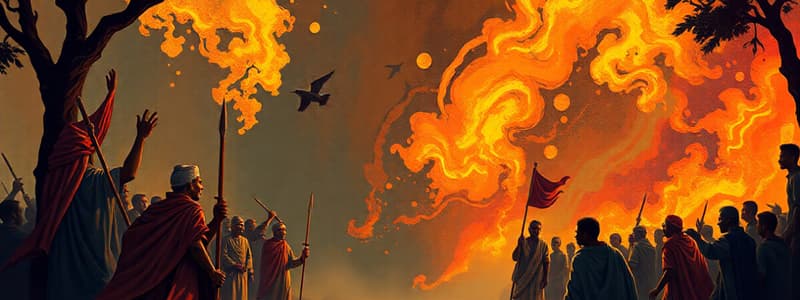Podcast
Questions and Answers
What major demand was made by the National Congress of British West Africa during their 1920 meeting?
What major demand was made by the National Congress of British West Africa during their 1920 meeting?
- Repeal of the Lugards Constitution
- Formation of political parties
- Complete independence from British rule
- Self-government and an elected legislature (correct)
The Clifford Constitution allowed women to participate in the elections.
The Clifford Constitution allowed women to participate in the elections.
False (B)
What principle did the Clifford Constitution introduce for the first time in British West Africa?
What principle did the Clifford Constitution introduce for the first time in British West Africa?
The elective principle
The Legislative Council created by the Clifford Constitution was responsible for making laws for only the __________ and Southern provinces.
The Legislative Council created by the Clifford Constitution was responsible for making laws for only the __________ and Southern provinces.
Match the following features of the Clifford Constitution with their descriptions:
Match the following features of the Clifford Constitution with their descriptions:
What was one of the main criticisms of the Clifford Constitution?
What was one of the main criticisms of the Clifford Constitution?
The Clifford Constitution was active for 22 years primarily in Lagos.
The Clifford Constitution was active for 22 years primarily in Lagos.
Name one of the newspapers that emerged due to the political activities stimulated by the Clifford Constitution.
Name one of the newspapers that emerged due to the political activities stimulated by the Clifford Constitution.
Flashcards
Clifford Constitution
Clifford Constitution
A system of governance implemented in Nigeria by British colonial authorities in 1922, aimed at introducing a limited form of self-rule and representation. It was a response to growing calls for greater political participation by educated Nigerians, the platform of the National Congress of British West Africa, and other key political factors.
Educated Elites
Educated Elites
A group of individuals possessing education and influence who felt excluded from decision-making in their country. Their discontent sparked calls for greater participation in political affairs.
National Congress of British West Africa (NCBWA)
National Congress of British West Africa (NCBWA)
A gathering held in Accra, Ghana in 1920, where representatives of different West African countries came together and demanded greater political autonomy and representation from the British colonial government. This conference was a crucial catalyst in pushing for reforms, setting the stage for the Clifford Constitution.
Legislative Council
Legislative Council
Signup and view all the flashcards
Retention of Existing Political Structure
Retention of Existing Political Structure
Signup and view all the flashcards
Elective Principle
Elective Principle
Signup and view all the flashcards
Political Activism
Political Activism
Signup and view all the flashcards
Demerits of the Clifford Constitution
Demerits of the Clifford Constitution
Signup and view all the flashcards
Study Notes
Background to the 1922 Clifford Constitution
- The educated elite were excluded by the Lugard Constitution, prompting them to advocate for inclusion in their country's affairs.
- The National Congress of British West Africa, meeting in Accra in 1920, empowered these groups to oppose colonialists and their African collaborators.
- The conference demanded self-governance and an elected legislature.
- The British government, perceiving the demand as unreasonable, contemplated ways to accommodate these groups, thus delaying their demands.
Features of the Clifford Constitution
- Existing political structure remained unchanged.
- A Legislative Council with 46 members was established to govern only the Lagos and Southern provinces, making laws.
- An Executive Council was created to advise the governor.
Features of the Clifford Constitution (Continued)
- Franchise was limited to male residents with a 100-pound annual income, residing for 12 months, thus favoring the wealthy and limiting participation.
- Local government systems based on the native authority structures were maintained.
- Indirect rule was extended to Southern provinces, particularly in the east, imposing warrant chiefs on the people.
Merits of the Clifford Constitution
- Introduced the elective principle for the first time in British West Africa, encouraging political activities in Lagos and Calabar.
- Led to the formation of political parties like the Nigerian National Democratic Party, the Peoples Union, and the Lagos Youth Movement (1923).
- Fostered increased political activism and awareness through newly established newspapers such as the Daily Times, Anglo-Africa, Lagos Weekly Record, the Mirror, and the West African Pilot.
- Provided stability to the Nigerian political system for close to 22 years.
Demerits of the Clifford Constitution
- Did not reflect the wishes of Nigerians despite widespread agitation.
- The Legislative Council's scope was limited, applying only to Lagos and Southern provinces; the Northern part remained excluded.
- The Legislative Council had no elected representatives from the North.
Demerits of the Clifford Constitution (Continued)
- Majority of the Legislative Council members were unelected Europeans who lacked understanding of Nigerian aspirations.
- The majority of Nigerians selected by the British authorities demonstrated a tendency to cooperate with them.
- The extension of indirect rule to Southern provinces demonstrated a lack of understanding of the region's political landscape.
- The franchise was narrow, restricting participation to wealthy men in Lagos and Calabar.
- Imposed without Nigerian consultation - effectively an imposed constitution.
- The Executive Council was dominated by Europeans and lacked Nigerians with real executive powers.
Studying That Suits You
Use AI to generate personalized quizzes and flashcards to suit your learning preferences.




